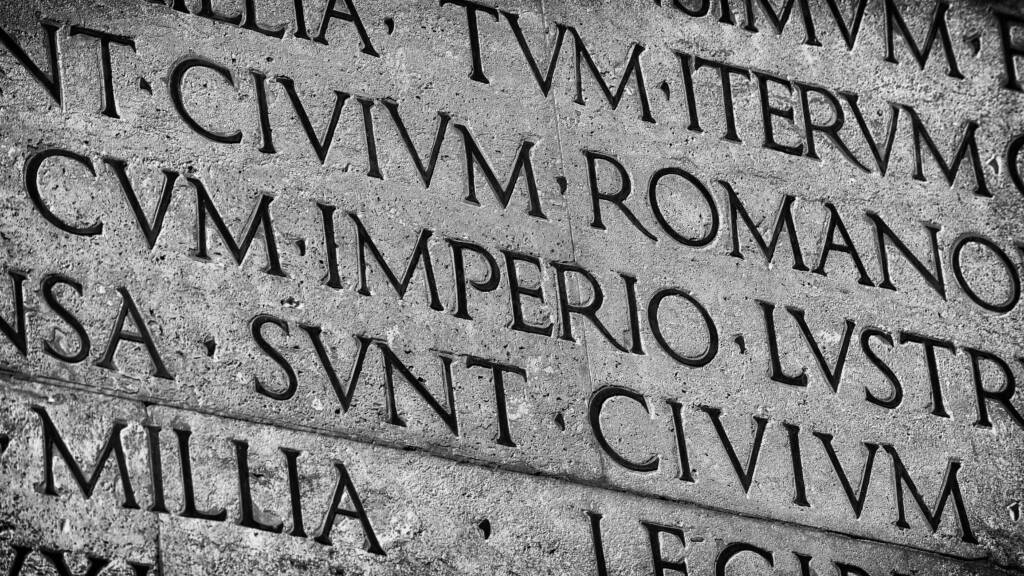
Latin 1

Introduce yourself to the culture and rich storytelling tradition of the ancient Romans through the study of Classical Latin. In the Latin 1 course, you will build a foundation of grammar and vocabulary skills to help increase fluency and language proficiency. You will explore the mythology, history, and culture of Rome and apply what you learn through translation practice, writing, listening, and conversation exercises while reading Roman stories that have stood the test of time as you trace the Latin roots that run through modern language and culture.
Major Topics and Concepts
- Identify key people and dates of the Roman monarchy, Roman Republic, and Roman Empire.
- Identify and apply 1st and 2nd Declension nouns, adjectives, and adverbs in translation.
- Identify and apply 1st, 2nd, 3rd, and 4th Conjugation verbs in translation.
- Identify and apply the irregular verbs sum and possum in the present tense in translation.
- Identify and apply noun cases (Nominative, Genitive, Dative, Accusative, and Ablative) in translation.
- Identify and apply personal pronouns in translation.
- Identify and apply Latin ago idioms in translation.
- Identify and apply Ablative case constructions in translation.
- Identify and apply Ablative and Accusative of Time expressions in translation.
- Identify and apply the present tense of verbs in translation.
- Identify cognates and false cognates in Latin sentences.
- Identify and apply prepositions in translation.
- Understand Roman numerals.
- Identify and apply cardinal and ordinal numbers in translation.
- Identify and apply English derivatives in practice.
- Understand Latin sentence structure and word order.
- Describe Roman education during the Republic.
- Describe Roman life, food, and entertainment.
- Examine the Roman Forum and the Roman street network.
- Compare ancient cultures and their relationship to Rome.
- Describe classical and ancient heroes and the hero’s quest.
- Describe Roman art styles and music.
- Compose sentences using Latin words.
- Describe the stories of the Roman gods Jupiter, Neptune, Pluto, and Ceres.
- Identify and apply 3rd Declension nouns, adjectives, and adverbs in translation.
- Identify and apply the imperfect, future, perfect, pluperfect, and future perfect tenses in translation.
- Identify and apply the vocative noun case and imperative verb mood in translation.
- Identify and apply the irregular verbs sum and possum in the future, imperfect, perfect, pluperfect, and future perfect tenses in translation.
- Identify and apply Roman name declining in translations.
- Understand Latin sentence structure and word order.
- Describe ancient medicine, health and sanitation practices, and medical tools.
- Understand Roman architectural and technological terminology.
- Identify Binomial Nomenclature.
- Compare modern scientific terminology to Latin root words.
- Describe ancient civilizations in Africa, Europe, Asia, and the Middle East and compare them to Roman Civilization.
- Describe the Roman Empire’s influence on the modern world.
- Describe the history, art, and culture of Pompeii and Herculaneum.
- Describe the effects of the eruption of Mt. Vesuvius in 79 CE.
- Compose sentences using Latin words.
- Describe the stories of the Roman gods Vulcan, Minerva, and Bacchus.
Course Materials
Students need to supply the following materials to complete the coursework.
Required:
- Microphone Sound card
- Speakers or headphones
- Microphone
- Device of choice to record video with audio
Competencies
Adjectives, Third and Fourth Declension, Verb Conjugation, Genitives, and Roman Numerals
Students will demonstrate an understanding of noun adjective pairs, 3rd, 3io and 4th conjugation verbs, irregular verbs of possum by translating definitions and derivatives when speaking or writing in Latin about topics such as mythological stories.
Datives and Idioms
Students will demonstrate an understanding of the uses of Dative, Accusative and Ablative cases, time expressions, prefixes, and idioms by translating definitions and derivatives when speaking or writing in Latin about topics such as daily life in ancient Rome.
Nominatives and Accusatives, First Declension, and Verbs Parts
Students will demonstrate an understanding of the usage of cases, the greetings and cognates, the verb of being sum, and the nouns in the 1st declension and 1st conjugation present tense regular verbs by translating definitions and derivatives when speaking or writing in Latin about topics such as historical Rome.
Noun-Verb Agreement, Prepositions and Ablatives, Second Declension, and Personal Pronouns
Students will demonstrate an understanding of personal pronouns, 2nd conjugation verbs, 2nd declension masculine and neuter nouns, and the use of the ablative case with prepositions by translating definitions and derivatives when speaking or writing in Latin about topics such as the fall of the Roman Empire.
Adverbs, Question Words, Imperfect and Future Tenses
Students will demonstrate an understanding of the imperfect and future tenses for regular and irregular verbs, adverbs, and interrogatives by translating definitions and derivatives when speaking or writing in Latin about topics such as science in ancient Rome.
Imperative Mood and Vocatives
Students will demonstrate an understanding of 3rd declension masculine, feminine, neuter and i-stem nouns, imperatives for regular verbs, and the vocative case by translating definitions and derivatives when speaking or writing in Latin about topics such as ancient civilizations and the Roman influence.
Perfect, Pluperfect and Future Perfect Tenses
Students will demonstrate an understanding of perfect, pluperfect, and future perfect tenses,, perfect system of sum and possum, and possessive adjectives by translating definitions and derivatives when speaking or writing in Latin about topics such as the city of Pompeii.

